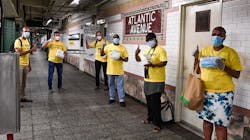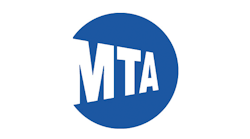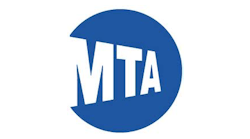Riders of New York Metropolitan Transportation Authority’s (MTA) system of subways, buses and railroads will be subject to a $50 fine if they refuse to wear a mask starting Sept. 14.
"Health experts agree that wearing a mask is the single best thing we can do to limit the spread of COVID-19," said MTA Chairman and CEO Patrick J. Foye. "The $50 fine gives us another tool to help achieve our goal of universal mask usage on New York City Transit subways and buses, Long Island Rail Road and Metro-North Railroad."
New York has mandated face coverings on public transit since April 17 when Gov. Andrew Cuomo’s executive order requiring riders and employees of public and private transportation cover their mouth and nose went into effect.
The $50 fine is in response to Gov. Cuomo directing MTA to develop a plan to bolster mask compliance across its public transportation system. Frontline MTA employees will not be responsible for enforcement. As with all MTA rules and regulations, enforcement will be handled by MTA Police Department, New York Police Department and Bridge and Tunnel Officers.
"While mask compliance in the MTA system remains very high, we want to make sure that people feel comfortable coming back to public transportation," Gov. Cuomo said. "I have asked the MTA to come up with an enforcement regimen so people know that not only are the cars clean and the stations clean, but the riders will be acting appropriately. We have to be able to say to the riding public that everyone will be wearing masks - and if they refuse to wear a mask they will be penalized."
MTA has claimed compliance with the face covering requirement on its system has been upwards of 90 percent. However, THE CITY, a local New York news resource, performed an admittedly unscientific spot check of routes around the region during the first week of September and found compliance to be around 77 percent.
"We know the vast majority of New Yorkers are already doing the right thing and wearing a mask while riding with us," Interim President of New York City Transit Sarah Feinberg said. "The fine is a last resort measure for those who refuse to comply. It's critical that every customer does their part to keep our system safe."
In addition to the increased sanitization practices put into place since the beginning of the COVID-19 pandemic and distribution of personal protective equipment (PPE) to employees, MTA launched two pilot programs to help riders acquire the needed PPE. One has seen the deployment of vending machines at subway and commuter rail stations that allow riders to purchase PPE, such as reusable face masks, gloves, hand sanitizer and sanitizing wipes. The second pilot program has installed free surgical mask dispensers inside 360 buses on 15 routes.
MTA also notes it recently launched public awareness campaign, "Operation Respect," as part of a multi-layered strategy to encourage riders to wear a face covering while on public transit. The agency has made available four million masks from the state of New York and city of New York available for free at station booths, across New York City Transit, Long Island Rail Road and Metro-North Railroad. Hundreds of volunteers with the MTA's "Mask Force" are distributing these masks to riders systemwide.

Mischa Wanek-Libman | Group Editorial Director
Mischa Wanek-Libman is director of communications with Transdev North America. She has more than 20 years of experience working in the transportation industry covering construction projects, engineering challenges, transit and rail operations and best practices.
Wanek-Libman has held top editorial positions at freight rail and public transportation business-to-business publications including as editor-in-chief and editorial director of Mass Transit from 2018-2024. She has been recognized for editorial excellence through her individual work, as well as for collaborative content.
She is an active member of the American Public Transportation Association's Marketing and Communications Committee and served 14 years as a Board Observer on the National Railroad Construction and Maintenance Association (NRC) Board of Directors.
She is a graduate of Drake University in Des Moines, Iowa, where she earned a Bachelor of Arts degree in Journalism and Mass Communication.



